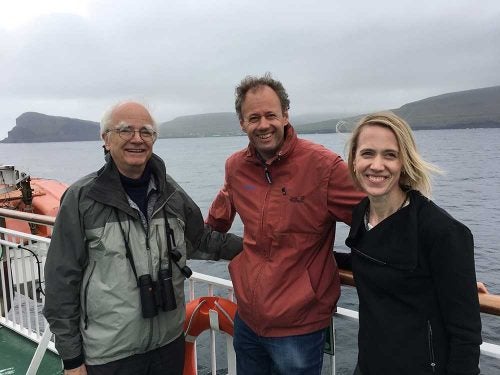 Event
Event
PPTOX VI Conference, Faroe Islands
The Faroe Islands constitute 18 islands in the North Atlantic with a population of slightly more than 50,000. Like many other communities around the world, the Faroese are exposed to PFAS through consumer products; however, they have a secondary source of exposure through their traditional dietary habits of consuming pilot whale meat and blubber. Due to biomagnification of persistent substances, the Faroese are therefore exposed to industrial contaminants from far-away sources and at levels that, in some cases, greatly exceed those normally encountered elsewhere.

On May 27-30, 2018, the PPTOX Conference (prenatal programming & toxicity) took place in Tórshavn, the capital of the Faroe Islands, to assess the weight of evidence and highlight new achievements on the effects of prenatal and early postnatal exposure to toxicants, as well their effects on the development. The conference was organized by STEEP Co-Director Dr. Philippe Grandjean (HSPH), in collaboration with Dr. Pál Weihe, Chief Physician at the Department of Occupational and Public Health in the Faroese Hospital System. Per- and polyfluoroalkyl substances were a major focus of the conference.
In regard to environmental hazards, fetal and early postnatal development seems to constitute the most vulnerable stage of human life. Among the effects of toxic exposures emphasized in the past were malformations and other adverse pregnancy outcomes. Subsequent studies highlighted maternal smoking and dietary deficiency or nutrient oversupply as important risk factors for child development and disease risks. In regard to industrial chemicals, dramatic effects of prenatal exposures have been recorded, with the Minamata Disease being the first major outbreak about 60 years ago. Recent research has revealed that more subtle effects during early development may also lead to functional deficits and increased disease risks later in life. This “fetal programming” hypothesis has gathered much support from both experimental and epidemiological studies. While health is determined by a variety of parameters, including genetic predisposition, health behaviors, and environmental factors, the interactions between them probably constitute a key to understanding the pathogenesis of important diseases and ill health. Substantial evidence now suggests that the prenatal and early postnatal environment is of crucial importance for gene expression, thereby affecting normal development and disease risks through adult life. The timing of exposure and the related gene-environment interactions are therefore crucial.
This continued epidemiological research on the impact of PFAS on pre-natal and post-natal health for the Faroese community enriches the STEEP team’s understanding of the adverse health impacts of PFAS. The following STEEP scientists presented their research on PFAS at the conference:
- Philippe Grandjean, Harvard T.H. Chan School of Public Health
The Faroese birth cohort studies and their wider impacts Late and delayed lessons on PFASs
- Dr. Damaskini Valvi, Harvard H. Chan School of Public Health
Developmental exposures to perfluoroalkyl substances and risk of type 2 diabetes in Faroese adults
- Elsie Sunderland, Harvard T.H. Chan School of Public Health
Can Profiles of Poly- and Perfluoroalkyl Substances (PFASs) in Human Serum Provide Information on Major Exposure Sources?

The conference attracted toxicologists, epidemiologists, pediatricians, oceanographers, and other specialists with an interest in environmental health, developmental toxicity, and human disease etiologies. The overall aims of the conference were:
- to disseminate front-line information on developmental toxicity and fetal programming, in regard to environmental health research;
- to enhance discussion and synthesis of information, thereby leading to discussions on improved research approaches to elucidate and unravel ambiguities in current understanding; and
- to stimulate improved interaction between research strategies and needs for documentation that can inspire decision-making to protect against adverse effects from developmental exposures to environmental hazards or modifying.
PPTOX is supported by the National Institute of Environmental and Health Safety (NIEHS) and the Basic & Clinical Pharmacology and Toxicology (BCPT)
More News
